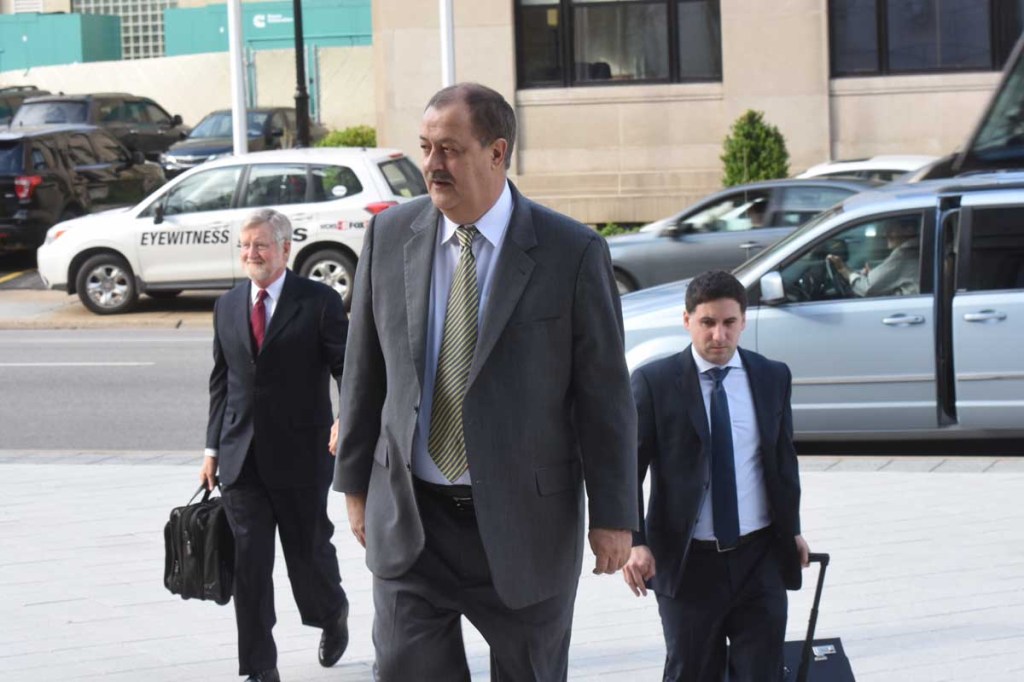‘Coal King’ gets year in prison in deaths of 29 miners
Published 2:35 pm Wednesday, April 6, 2016

- Former Massey Energy Don Blankenship, center, leaves the Robert C. Byrd Federal Courthouse in Charleston, W. Va., during his trial.
CHARLESTON, W.VA. – A federal judge Wednesday sentenced Donald L. Blankenship, the coal executive criticized for the deaths of 29 miners, to one year in prison and fined him $250,000 for conspiracy to violate safety standards.
U.S. District Judge Irene Berger issued the maximum misdemeanor penalty one day and six years after the miners died in an explosion at the underground Upper Big Branch Mine in southern West Virginia.
Families of the victims sat in the front row of the courtroom during the sentencing in the deadliest U.S. mine explosion in 40 years. They expressed relief that Blankenship, 66, would be sent to prison. But they also expressed regret the judge did not allow them to address Blankenship.
“Her not allowing us to actually, finally say something to that man is not right,” said Betty Harrah, who lost her 40-year-old brother in the explosion. “If he has a right to speak, we shold have the right to speak.
Blankenship told the judge he was innocent of the conspiracy charge and attempted to apologize to the relatives of the mine disaster victims until Judge Berger cut him off.
“You should be someone we are able to tout as a West Virginia success story,” said the judge. “Instead of being able to tout you, we are here.
Tommy Davis, a lifetime coal miner who lost a son, brother and nephew in the explosion, said Blankenship had “no remorse at all. No regard for human life at all.”
Family members said they were unhappy with the outcome of Blankenship’s six-week trial last year, but
Prosecutors sought the maximum penalty in light of a jury finding Blankenship not guilty three months ago of more serious felony charges carrying a 30-year prison sentence and heavier fines.
Known as the king of coal in Appalachia for his tough leadership of Massey Energy, Blankenship insisted he had nothing to do with the mine explosion, contending it resulted from “natural causes.”
But prosecutors, who did not charge him with causing the explosion, said he intricately contributed to the decisions to violate federal mine safety rules that could have prevented the tragedy. They characterized his attitude as profits over essential safety precautions.
Blankenship served as president and chief executive officer of Massey Energy, which operated Upper Big Branch mine through a subsidiary company, Performance Coal. Massey Energy sold eight months after the explosion to Alpha Natural Resources for $7.1 billion.
Attorneys for Blankenship said he would appeal his conviction and sentence, which includes one year of supervised release after serving his prison term.
The mine explosion in the tiny town of Montcoal occurred at 3:27 p.m. on April 5, 2010. Authorities determined the explosion was caused by high levels of methane mixed with coal dust. It took five days to recover all the victims’ bodies from inside the mine.
In their sentencing memorandum, prosecutors led with a list of 14 major mine disasters dating to the May 1, 1900, coal dust explosion at a mine in Utah that killed 200 miners. They said they did so as “a stark reminder that the laws on mine safety are not just words on paper.”
The Upper Big Branch explosion, they said, resulted from “the bitter fruit of decades of tragedy. We have known for a very long time what makes coal mines explode. We have known for a very long time how to prevent it. And, sadly, we have known for a very long time that some mine operators will ignore these hard learned lessons until the law compels them to take notice. The mine safety laws, it is said with good reason, are written in coal miners’ blood.”
U.S. Attorney Steve Ruby said a maximum one-year term in prison for Blankenship amounted to “paltry” punishment for disregarding safety standards that led to the mine tragedy.
Blankenship’s lawyers asked that he be allowed to remain free on $1 million bond until his appeals are settled, arguing he is neither a flight risk nor a danger to the community.
Details for this story were provided by the Beckley, W.Va., Register-Herald and West Virginia Public Broadcasting.
Details for this story were provided by the Beckley, W.Va., Register-Herald.





